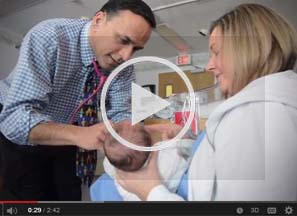Patient Stories

When Kate Meehan went in for her regularly scheduled ultrasound at 34 weeks of pregnancy, she did not expect a reason to be concerned. Her pregnancy had been progressing without incident and her twins, Liam and Maggie, were healthy and developmentally on track. She and her husband, Bobby, were ecstatic about the prospect of starting their family. So it came as a shock to the expectant parents from Salem when doctors explained that one of their babies, Liam, had developed intrauterine growth restriction (IUGR) and had stopped gaining weight.
A cesarean delivery of both twins would have to be performed—as it turned out, later that very same day. Over the emotionally charged month that followed, the Meehans became well acquainted with the staff of NSMC’s Level IIB Special Care Nursery and came to appreciate not only the clinical expertise it provided in caring for their premature babies, but also the nursery’s unwavering kindness and compassion. “We certainly hadn’t planned on having the babies when we went in for that appointment,” says Kate.
“We were relieved that we had passed the 32-week mark, which we knew was a milestone for development. But I was still two months shy of my due date and we were incredibly scared about the babies’ ability to breath and eat on their own.”
Affecting just 2 to 3 percent of all pregnancies, IUGR is a term used to describe a baby who is not growing at a normal rate inside the uterus. This can occur for a variety of reasons, but in the case of the Meehans, it was causing Maggie to receive more oxygen and nutrients than her brother.
Admitted to the NSMC Birthplace at Salem Hospital that afternoon, Kate was scheduled to begin a round of steroid treatments to help strengthen the babies’ lungs prior to delivery. Before this could even take place, Liam’s heart rate began to drop. The surgery had to be performed immediately. Just hours later, Liam and Maggie were delivered by NSMC OB/GYN Justine Gelinas, D.O., weighing just 3 lbs. and 5 lbs., respectively.
“The babies were incredibly small and fragile—just ridiculously tiny,” recalls Bobby, who was the first to see the twins after birth. “Liam’s head fit right in the palm of my hand.” The babies were immediately transferred to NSMC’s Special Care Nursery, also located at NSMC Salem Hospital, where a team of neonatologists, pediatricians, nurses and respiratory therapists worked to stabilize their vital signs. Maggie, though larger in size, was less developed than her brother. In addition to supplemental oxygen and IV feeding tubes, she also required the use of a continuous positive airway pressure (CPAP)machine, sometimes used to treat preterm infants whose lungs have not fully matured. Both were kept in incubators to fight jaundice.
“As a licensed Level IIB Special Care Nursery, we are well equipped to care for high-risk babies born as early as 32 weeks,” says Sanjay Aurora, M.D.,M.P.H., Chief of Newborn Medicine. “Our first priority with Liam and Maggie was to assist them with breathing, keeping them stable and helping them grow. Our excellent staff is very supportive of parents. We are quite aware that having premature babies is an emotionally challenging experience.”
The Meehans describe the days and weeks that followed as being full of small victories and a few setbacks. Liam continued to have feeding issues and dropped to 2 lbs. 6 oz. before finally bulking up. Overtime, the twins continued to grow and develop and were eventually sent home, Maggie after 17 days and Liam after 27.
Two years later, both are “happy, fun, curious, sassy little kids,” according to their mom. “The whole experience was incredibly difficult,” says Kate. “All you want to do is bring your babies home and start your family.
"What made all the difference, she says, was the exceptional care they received. “Not only were the staff incredibly skilled, they were beyond compassionate and supportive. There was always a smile for us when we walked through the doors, a greeting by name, a hug when needed. We felt as though we were always a priority and that everyone there had all the time in the world for us."


